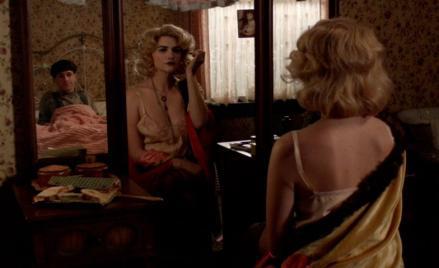Paul, Seth:
That fried-chicken peddling, hug-bullying, watch-stealing menace of a grandma has critics and viewers debating whether Mad Men has gone overboard this season or turned the reins over to David Lynch, or, as you suggest, Paul, has exposed the show’s less than sophisticated relationship to race. But I thought the existence of Grandma Ida was an acknowledgment of just how powerful a hold race has on the 1968 psyche of America. Remember Carla, the loyal and devoted maid of the Drapers, summarily dismissed in Season 4 by Betty because she let Glen Bishop linger too long one day? Grandma Ida is Carla’s revenge. When Bobby asks, “Are we Negroes?” the line is funny, but also captures a deep cultural fear—one that the show has been scratching at in various ways but which by 1968 (unlike, say, in Jackie Robinson’s era) it’s no longer acceptable to express, at least not if you live in a Manhattan high-rise. The Negroes are here, the riots have started, and you are no longer safe in your own home.
None of this was explicit, of course, because nothing in this episode was explicit. It operated at the level of fairy tale, or Freudian dream. (Grandma Ida could have been the witch in Hansel and Gretel, tempting the abandoned children with offers of hot food and sweets.) You could tell we were in the land of the id because of the nonsensical, meandering dialogue. In the usual style of people who are wasted, no one could ever finish their sentences. Don kept leading up to a big point but not getting there. “What’s the answer to all of life’s problems?” he asks Peggy and Michael, after excitedly calling them in to tell them he’s cracked the code. “A Chevy?” asks Michael, the only guy in the office who didn’t take his shot from Dr. Feelgood (aka, Max Jacobson). But there is no answer, no key, no cracking the code. Remember Roger’s speech from the first episode about the door, the ubiquitous metaphor of the season: Life isn’t leading in any particular direction. You just open a door (or peek through one or put your ear against it) and all you’ll discover is another door. Or as Stan put it, you can be on the verge of the big revelation, the thing that will explain all other things, and then someone will flush a toilet in your head.
What’s left when you’ve lost all the codes and answers, or when you’re having a bad trip? Fear and dread. Don is visited by his very worst memories, his Mommie Dearest-level memories, about the mother who wasn’t his mother beating him with a large spoon. Weiner seems to subscribe to a very Freudian view of human nature, in which there are some wounds you carry around that are so deep and painful that you can never find comfort from them. At one point Stan quotes Edgar Allan Poe’s “Annabel Lee,” about a man who has entombed himself in the tragedy of a childhood love and can never move past it, just as Don can never really move past his own childhood.* Seth, you asked what he wants from Sylvia? Mothering, comfort, safety, sure. But mostly he wants not to be abandoned on the other side of that door, and anyone who leaves him there will, by Freudian rules, inevitably have a hold on him.
This episode was about the grandest of all vulnerabilities, which drives every fairy tale, horror movie and nightmare: abandonment by your mother. Megan, Grandma Ida, Aimee all leave the children alone in the woods. Even Peggy, in her confessional moment with Stan, makes a veiled reference to her mothering crime. (The only decent mother turns out to be Betty, who all but calls her daughter a slut but at least understands the basic requirements of the job.)
But fairy tales are stocked with orphans for a reason, because they allow us to work out our deepest fears. Seth, you asked if the episode was meant to evoke the chaos of 1968. (Over on Brow Beat, Forrest Wickman posits the theory that it’s all about Vietnam.) In one of the brainstorming sessions, Peggy throws out the Vietnam-era idea that “the child is the father of the man.” And I’m sure you noticed Sally reading Rosemary’s Baby. The big reveal of that book is that while Rosemary has been trying to protect her baby from a Satanic coven she’s worried will steal it, it turns out that baby is the one that’s evil, the spawn of Satan. Unlike the viewers of Mad Men, Sally doesn’t seem all that freaked out by Grandma Ida. She’s just mad that she acted like a “stupid little kid.” And she uses the opportunity to get one over on her father, when she tells him “I realized I don’t know anything about you.”
And Seth, I have never knowingly collaborated with a speed freak, but I did once make the staff of DoubleX drink as much as they do on Mad Men and try and make it through the work day.
Do you have any idea what the idea is?
Hanna
Correction, June 3, 2013: This post misspelled Edgar Allan Poe’s middle name. (Return to the corrected sentnece.)
